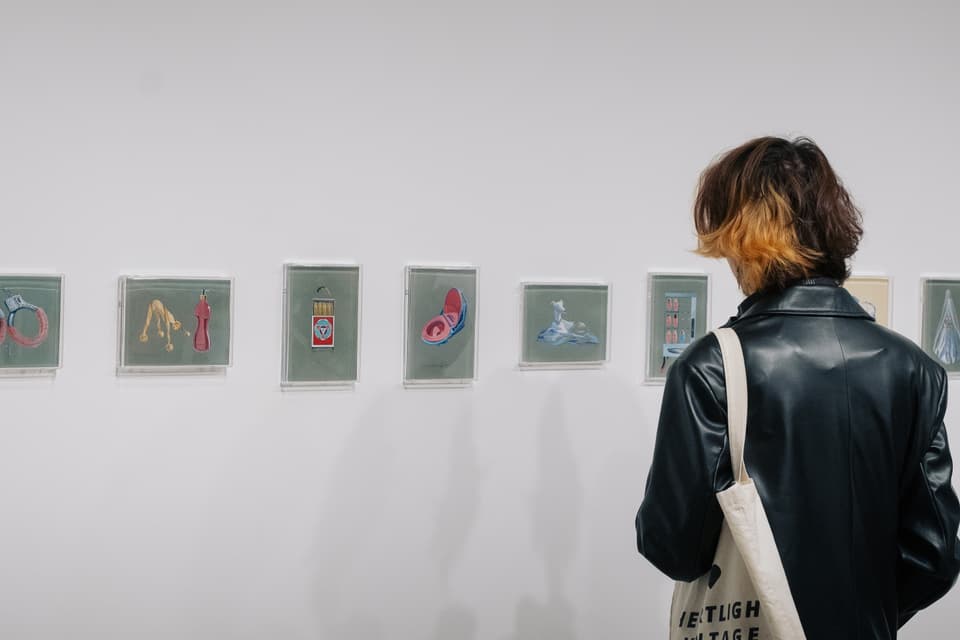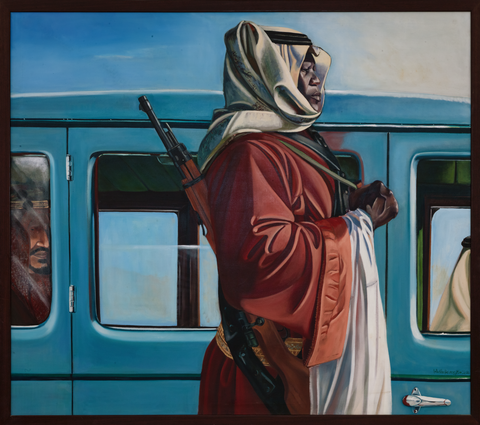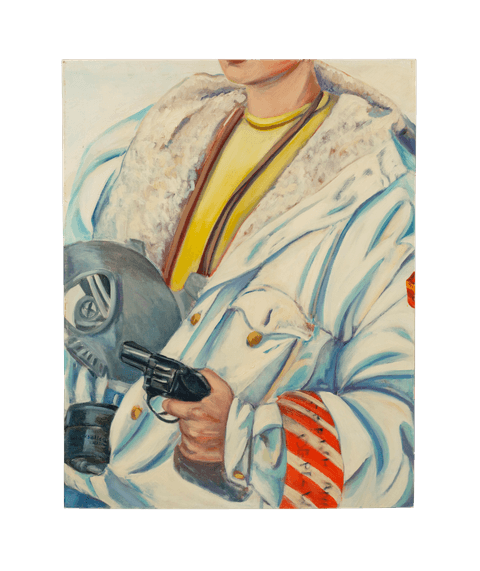To HAVE & TO HOLD
"In my culture", she writes about her series A Wife is... A Husband is... "from the time a girl is a toddler, she is groomed both mentally and physically for her future husband. She is taught every version of self- hate and self-doubt. She is told she is impure. Skinned of her dignity, folded into submission, and deprived of the right to control her own body, a female child is conditioned to become a feeble, dependent, robotic entity, incapable of expression or argument."

- May 3, 2024 - August 28, 2024
- Opening: Tue-Fri, 11am-6pm
- Nagel Draxel - Munich
Galerie Nagel Draxler is proud to present the first exhibition of Riyadh-based artist Halla Bint Khalid in Germany.
Halla Bint Khalid was born in Saudi Arabia in 1971. She was 8 years old when, on November 20, 1979, militant Islamists occupied the Great Mosque of Mecca and seized many pilgrims aiming at overthrowing the Saud royal dynasty and establishing an end-time theocracy. The Saudi royal family, which had already increasingly legitimized its rule in religious terms since the 1960s, in order to ideologically counter both Nasser's Arab nationalism and communism, further intensified its religious policy as a result of the terrorist act. Religious Sharia regulations were tightened and more strictly controlled, Islamic preachers and Wahhabi religious scholars gained increasing influence. These pivotal events can be seen as a historical backdrop to the restrictive climate during Halla Bint Khalid's coming of age and her young adulthood characterized by the desire to become an artist. They are the historical background to the strictly regimented lives of Saudi women of her generation and subsequent generations.
"In my culture", she writes about her series A Wife is... A Husband is... "from the time a girl is a toddler, she is groomed both mentally and physically for her future husband. She is taught every version of self- hate and self-doubt. She is told she is impure. Skinned of her dignity, folded into submission, and deprived of the right to control her own body, a female child is conditioned to become a feeble, dependent, robotic entity, incapable of expression or argument."
The traditional role that Bint Khalid had to fulfill left little room for her life as an artist. However, despite the duties imposed on her, she developed her artistic practice early on through private and self-directed studies.
"I was lucky to have private art tutors in my teen years. One of these, Alex, who was from the US, insisted that no lens can compete with direct experience. Hence, she trained me to work from life and not from photographs. I managed, but one day she threw me off balance. She coolly informed me that it was time I learned more about anatomy, and that I have to paint nudes. In trying to be a good eighteen-year-old Muslim woman, I explained to her that gazing at bare skin was not condoned by Islam.
Despite my pleas, during our next lesson she emerged from the guest washroom wearing a bikini. I didn’t know where or where not to look. She asked me to pull out my watercolors and paint her quickly in monochromes. I was trained to take orders from my superiors, so I complied, despite my confusion and panic. I worked fast to reduce the length of sinning time, attempting to only half-look at the contours of her body."
In addition to her paintings and watercolors, with which she documented the hidden lives of Saudi women in the 1990s, Bint Khalid began writing and illustrating children's books. She established a publishing house in 1997 and has since published 18 titles for children in both Arabic and English. She regularly visits schools to read and speak with children about social awareness and independent thinking.
"In contrast to the didactic and formulaic books mostly from Lebanon and Egypt, there is a children's book writer and artist working independently. Halla has the voice of a real children's book writer, and as an artist, she is distinctive. Her books have charm and lure" wrote Eden Ross Lipson, children's book editor of the New York Times.
Sadly, the oppression of women, the suppression of their self-determination and their desires, their unequal treatment and their exploitation is still a worldwide phenomenon in the 21st century. In the United States, for example, we are currently seeing hard-won women's rights being viciously restricted again by the Republican-dominated Supreme Court. The aggression directed against women in many places around the world is directed against the freedom and human rights that should be universally guaranteed. Yet the legal institutions that should enforce and protect these rights are tragically being abused to curtail them.
In her famous series Body Beautiful, or Beauty Knows No Pain (ca. 1966–1972), Martha Rosler extracts depictions of womens’ bodies from popular media sources – glossy print ads and men’s magazines – and reassembles them in ways that upend the original messages. Rosler is largely concerned with the external pressures, expectations, and fantasies projected upon women and the exploitation of their labor. With their fragmented materiality, the works expose the glaring commodification of women’s bodies, posed, segmented, and packed like products for consumption; in some, Rosler reconceives images of women meant for male consumption as gestures of defiance and expressions of liberation.










